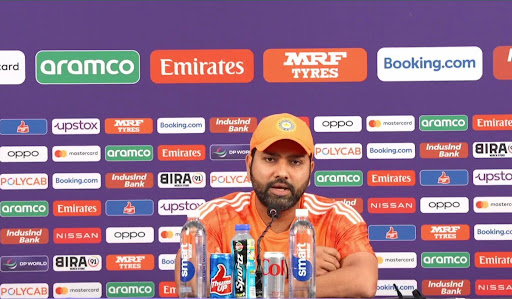Rohit Sharma: We have to create the environment that is needed for the team and that is mandatory

Rohit Sharma described the team management’s efforts to help ease the anxiety that always descends on a high-profile team like India during a home World Cup campaign, but he was eager to point out that the strategies weren’t all that different from those employed by earlier administrations.
There is a theory about “the shushhh” that occurs before an India pre-match press conference begins. When a player or coach addresses the media, the general chatter in the room abruptly stops and everyone calls for silence.
The louder the “the shushh”, the higher the grade of the cricketer who has stepped in, the bigger the significance of the match he or she is about to preview, or both.
On Tuesday, November 14, “the shushh” that preceded Rohit Sharma inside the Wankhede Stadium seemed important. The last six years have seen India fail to win a knockout game at an ICC event due to events at The Oval, Adelaide Oval, Old Trafford, Rose Bowl, and The Oval again.
Or maybe it was just that sense of a cycle being finished. Or perhaps it was because Rohit’s squad has performed exceptionally well in this home World Cup. Simply said, there was an inevitable sense of ceremony when Rohit spoke ahead of the semifinal because it was Diwali week.
In many ways, this was a faultless, likable, and engaging performance by the India captain, who has come a long way in the art of public speaking. It was consistently coherent, breezy in tenor, and diplomatic, even though it was not particularly revealing in its details for much of its 25-minute duration.
When asked if this is the most dominant World Cup team of his career, Rohit gave a glimpse into his vision for the role of captain.
“I just believe that as a captain, if you have decided that this is how you want to play as a team, then there needs to be clarity amongst the team,”
he said.
“And then if a certain player wants to go out there and play in the way that you want him to play, you’ve got to back that player to the hilt. And that is what we’ve done.
“We’ve backed certain players because we’ve given them a different role. And if they perform the role, well and well, but even if they don’t, which will not come off in every game, we have got to back that player and tell him that we stand by you. That is something that I believe in and I want to do it as much as I can from my side, and I’ve also got to give credit to Rahul Bhai [Dravid] as well you know to buy into that thought of not changing too much when the player doesn’t come off with that plan.”
He described the team management’s efforts to help ease the anxiety that always descends on a high-profile team like India during a home World Cup campaign, but he was eager to point out that the strategies weren’t all that different from those employed by earlier administrations.
“We started in Australia in the last World Cup; we started there the same way. We reached Australia 10 or 15 days early. And we had set up a small camp in Perth for seven or eight days. There is an island near Perth, so we went there. We went away from cricket. Wherever we get a chance, we try to do activities like that. To keep the team’s environment light. It’s not like it’s only happening in the last two years. It used to happen before as well. But now, I don’t know. I don’t know if it’s more visible now.”
According to Rohit, the team and its support staff held a Rest and Recreation session in Dharamsala after the first round of five league games as part of their efforts to maintain a positive atmosphere in the camp throughout this World Cup campaign.
This included a fashion show, details about which he wasn’t forthcoming with.
“Our conscious effort has been on this, that the team’s environment does not change based on the results,”
he said.
“We have to create the environment that is needed for the team and that is mandatory. And this cannot be done by one or two boys. All the boys need to come together, including the support staff. So, like we were in Dharamsala, we had a five or six-day break there. We stayed in Dharamsala for two days. We did a lot of team activity there. We did a fashion show there, but no one knows about that. It’s a good thing that no one knows about it.”
A lot of the time, the conversation would swing between the past and the immediate future. The players understood in the back of their minds what had happened at this stage four years ago, and Rohit complimented the New Zealand team, calling them ‘most disciplined’ and’ smart’. He also realized that there was no escaping history.
For an Indian captain, who is evaluated only based on the result, tournaments like this can seem all-consuming. It was important, he said, to switch off when not on the field.
“I have a family with me, so my mind goes here and there, which is a very good thing,”
he said.
“When I go to my hotel room, we completely stay away from cricket. We discussed a lot of other things. It’s a good thing. You think a lot about cricket, yes, but when you have time, when you have a chance to not think, then you shouldn’t think. Because, even if you think all day, what will happen? So it is important to think about something else.”
It was his own legacy that Rohit did not want to consider, not in this conference room and not at this point in the tournament.
He didn’t partake in the narrative arc of growing up as a cricket player at the Wankhede Stadium to now captaining the country here in a World Cup semifinal, even if he was more open with an answer to a similar question in Chennai at the beginning of the tournament.
“I don’t think there’s so much time to think about it. The focus is on the game, and what we have in hand tomorrow. I seriously have no time to think about my journey, and what it has been in the past. Probably after 19 November, I will think about it. Right now, it is just business and pure business of getting the job done for the team.”
He then departed shortly after that to supervise his teammates’ net preparation, get a second opinion on the Wankhede pitch, which he thought was still unbracketable after four games, feel around the outfield looking for signs of dew, and finally roll his arm to Kuldeep Yadav, who is left-handed. And then he was gone, along with his group. There was no place for any more shushing now.

